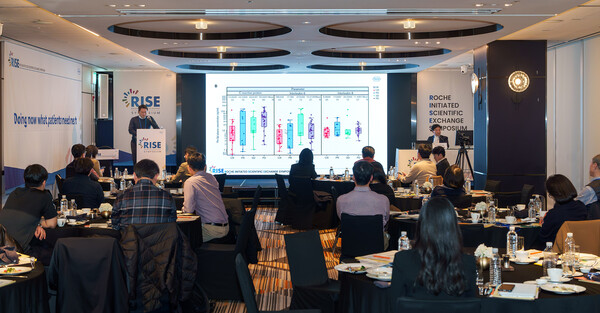Roche Korea hosted a two-day RISE (Roche Initiated Scientific Exchange) symposium on Thursday and Friday last week, shedding light on the clinical significance of the pioneering bispecific antibodies for blood cancer, Columvi (ingredient: glofitamap) and Lunsumio (mosunetuzumab).
Comprising five sessions, the symposium delved into the latest treatment methodologies for blood cancer, with a particular focus on diffuse large B cell lymphoma (DLBCL) and follicular lymphoma (FL).

On the first day of the event, Professor Kim Seok-jin of Hematology-Oncology at Samsung Medical Center (incoming chairman of the Korean Society of Hematology) and Professor Yang Deok-hwan from Chonnam National University Hwasun Hospital's Hematology-Oncology Department (chairman of the lymphoma research group under the Korean Society of Hematology) assumed the role of moderators.
Presenting on "Patient Journey and Unmet Needs in DLBCL," Professor Kim said that DLBCL progresses swiftly with unfavorable prognoses upon relapse or resistance. He highlighted that Columvi demonstrated a complete response rate (CR) of 40 percent (61/155 [95% CI: 32-48]) and an overall response rate (ORR) of 52 percent (80/155 [95% CI: 44-60]) in the NP30179 trial targeting relapsed or refractory DLBCL patients.
Pablo Umaña, Head of Cancer Immunotherapy Discovery, Roche Pharma Research and Early Development (pRED), explained the development journey of Columvi, the first-in-class CD20xCD3 bispecific antibody. He underscored Columvi's high specificity and targeting capability, low off-target toxicity, and effective resistance prevention.
Professor Koh Young-il from Seoul National University Hospital's Hematology-Oncology Department and Professor Jeon Young-woo from Yeouido St. Mary's Hospital's Hematology-Oncology Department presented on "Optimizing +3L DLBCL Management With Emerging Therapies" and "Endpoints of Interest in Interpreting Clinical Trials of DLBCL," respectively.
Professor Koh emphasized Columvi as an effective third-line treatment, mitigating treatment uncertainty by maintaining fixed dosing every 12 weeks (approximately 8.3 months) based on its clinical utility.
Professor Jeon highlighted the necessity of exploring appropriate endpoints for assessing new drug value, such as PFS24 (progression-free survival for 24 months post-treatment) and EFS24 (event-free survival for 24 months post-treatment), and underscored the role of Polivy in first-line DLBCL treatment.
As the first day concluded, Professor Yang, the moderator, mentioned that as the number of treatment lines increases, the prognosis for DLBCL worsens. He highlighted Columvi as an effective third-line treatment option for relapsed or refractory DLBCL patients who had failed previous therapies, noting that about 67 percent of patients who achieved complete response maintained their response status 18 months after treatment.
On the second day of the symposium, Professor Do Young-rok of Keimyung University Dongsan Hospital's Hematology-Oncology Department moderated the session. He introduced Lunsumio as a promising treatment option for FL, boasting a complete response rate (CR) of 60 percent (54/90 [95% CI: 49-70]) and an overall response rate (ORR) of 80 percent (72/90 [95% CI: 70-88]).
The speakers on the second day included Professor Lee Myung-won of Chungnam National University Hospital's Hematology-Oncology Department, who discussed "Adverse Event Management Strategy in NHL Treatment," and Professor Yoo Kwai-han of Gachon University Gil Medical Center's Hematology Internal Medicine Department, who presented on "New Evolution in +3L FL Treatment: How Does It Matter?"
Professor Lee emphasized Lunsumio as a treatment with a favorable safety profile and manageable adverse events, with cytokine release syndrome (CRS), the most common adverse event, occurring at mild grades (1-2) and limited to the early stages (first cycle) of treatment.
Professor Yoo introduced emerging options like Lunsumio for relapsed or refractory indolent FL, addressing the frequent relapses and lack of effective treatments.
Shin Su-hee, Director, Healthcare Innovation Cluster Lead at Roche, said, based on over 20 years of leadership in the field of blood cancer, Roche holds six pipelines, including recently approved Lunsumio and Columvi, Polivy, the first-line therapy for DLBCL after 20 years, the world's first CD20-targeted therapy, Mabthera, Mabthera subcutaneous injection for improved convenience, and Gazyva, the first Type 2 glycoengineered CD20 antibody.
She emphasized Roche's commitment to leading paradigm shifts in blood cancer treatment and improving the treatment environment for Korean blood cancer patients.
Related articles
- Could Roche’s lymphoma drug Columvi be a rival against Novartis’ Kymriah?
- Roche's double-antibody DLBCL treatment Columvi nabs Korean nod
- Roche’s follicular lymphoma drug, 1st to receive approval through fast-track program in Korea
- ‘Domestic DLBCL secondary care landscape at its most vulnerable’
- Roche Korea appoints Ezat Azem as new general manager
- Roche executives discuss innovation, collaboration in lymphoma treatment
- Roche Korea names Kang Hyun-ju as new A&P Cluster lead
- Will the release of Lunsumio’s 3-year data open way for reimbursement?

